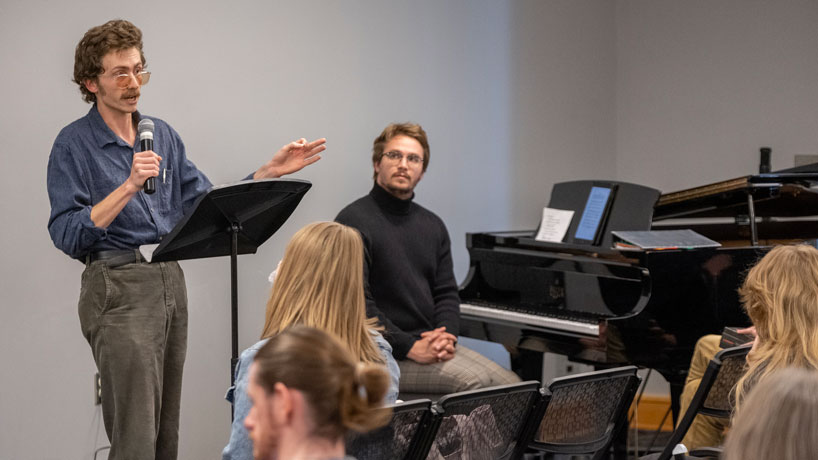
During last Friday’s Undergraduate Research Symposium, anthropology major Shane Devine presented his senior thesis project, which consists of the first-ever biography of Hazel Felman, an annotated catalogue of all of her known works and a public performance. (Photo by Derik Holtmann)
About two years ago, Shane Devine was reading Carl Sandburg’s “American Songbag,” a collection of folk songs published in 1927, when he came across a name he hadn’t heard of before. In the acknowledgements in the beginning of the book, Sandburg includes a biosketch of contributor Hazel Felman, who had composed a piece of music, “The March of the Zizzies,” based off one of the famous poet’s children’s stories.
As a huge Sandburg fan himself, Devine was intrigued, and quickly went to look up a recording of the song online – but nothing turned up. Next, he tried searching for the sheet music. Once again, nothing turned up. Finally, he searched for Hazel Felman herself, and found nothing.
Devine’s curiosity was piqued, so he reached out to the Rare Book and Manuscript Library at the University of Illinois Urbana-Champaign, which boasts a large collection of Sandburg’s works. Not only did they have “The March of the Zizzies” score, but the curator also sent Devine hundreds of letters Felman had sent her close friend Sandburg over the years.
“I hadn’t asked for them, but I was intrigued, so I started reading the letters,” Devine said. “It immediately became clear that she led this fascinating life, that she was this notable person, but there was no information about her online. There were no articles written about her. So I realized that there was this rare opportunity to conduct deep research on a truly influential person who was inexplicably erased from history. It posed an interesting challenge, especially in a time when there is this expectation that all information worth knowing is readily available online.”
Since making that initial discovery two years ago, Devine, a senior anthropology major at the University of Missouri–St. Louis, has jumped headfirst into researching Felman’s life and work. No biography of the classical composer exists, so he pored over primary source materials including letters of correspondence, newspaper articles and performance reviews to sketch out her life himself. He found that Felman (1892-1974), a composer and arts patron from Chicago, maintained a vibrant career in the classical music industry from 1916 to 1945, collaborating with several notable 20th century literary and musical personalities and producing hundreds of compositions.
All of that work has culminated in Devine’s senior thesis project, which consists of the first-ever biography of Felman, an annotated catalogue of all of her known works and a public performance that was held during UMSL’s annual Undergraduate Research Symposium on Friday afternoon. For the latter, Devine worked with students in Leslie Allnatt Mallory’s vocal music class to put together a performance of Felman’s works – some of which had not been performed since the 1930s. Students Rita Schien, Alex Wurl and Parker Miller, along with pianist Zach Neumann, performed works including “The March of The Zizzies,” “Be My Soul” and “Sing Bravely in My Heart.”
“It was really an interdisciplinary collaboration,” Devine said. “At the beginning of the semester, I gave Dr. Allnatt the scores that I had collected so far, and she selected students she thought would best serve the songs and worked with them, teaching them the songs. That’s kind of led us up to now, which has been kind of cool for me. It’s really felt like a true collaboration in that sense because while the students have been learning the songs, I’ve been working on the biography and the catalogue.”
Devine has often brought his love of music into his anthropology work at UMSL, and he hopes to pursue a master’s degree in ethnomusicology down the road. He plans to continue to research Felman and said the process has made him realize how many more composers and musicians there are like her, devoting their lives to creating music only to then be forgotten.
“The concept that an artist that has been forgotten must not be worth remembering or must not have had great influence on their community, not only does injustice to them, but it perpetuates a distorted image of the past and imposes itself on the present and becomes a blueprint for the future,” Devine said in his closing remarks during Friday’s presentation. “So it is my sincere hope that this project contributes in some way to the ongoing reclamation of the history of American classical music by ensuring that Hazel Felman’s life and work are no longer lost in the dark.”
Devine’s presentation on Felman was one of over 70 oral and visual presentations held during the Undergraduate Research Symposium, hosted in the Millennium Student Center. The annual academic conference featured dozens of presentations throughout the day, spanning topics such as the Pruitt-Igoe housing development, connections between Star Wars and Nazi Germany, the effect of caffeine on bee behavior, influential queer Black men in entertainment and the development of gender bias in STEM.














